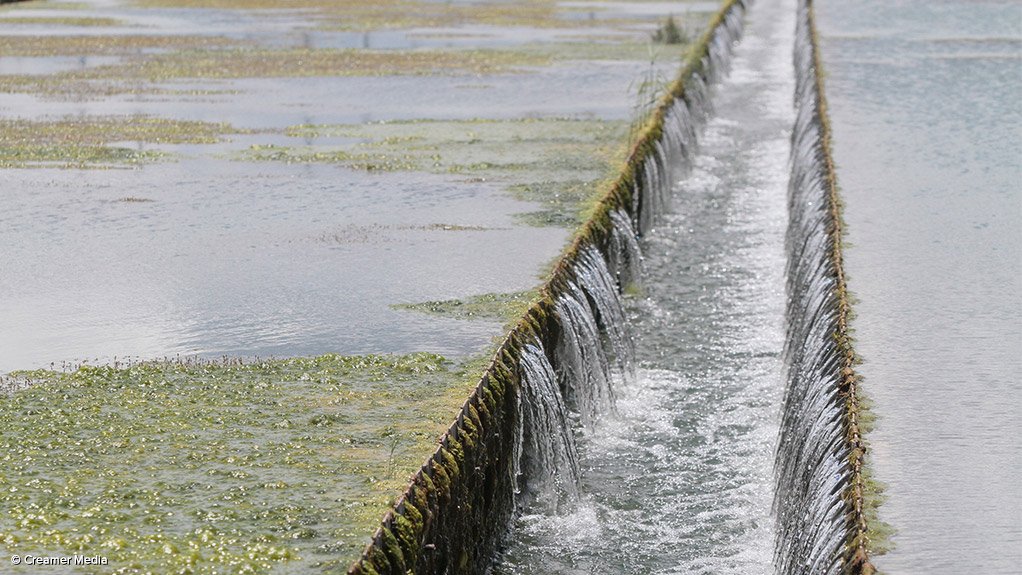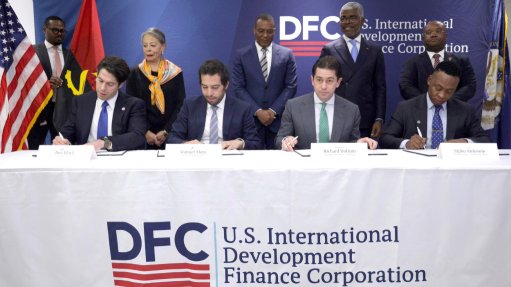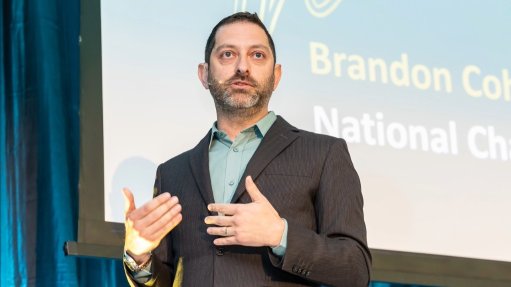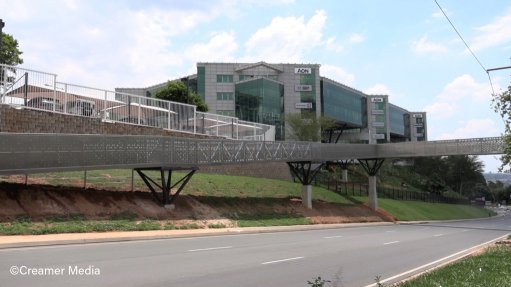South Africa urged to consider greater reuse of water resources
Water is an infinitely reusable resource and South Africa must pursue the treatment and reuse of its wastewater to unlock the benefit it will gain from having sufficient water resources available for the economy, water experts said during a panel discussion at the Africa Automation Technology Fair, on May 9.
South Africa was and always had been an inherently water-constrained economy and the discovery and mining of gold drove innovations to bring water to mining areas, most notably the Witwatersrand area, University of the Free State Centre for Environmental Management director and water resource specialist Dr Anthony Turton noted.
The first National Water Resource Strategy published in 2002 showed that 98% of all the water resources in the country had been allocated. Subsequent modelling indicates that South Africa's yearly rainfall has since fallen.
However, the country’s economy did not need to be water-constrained, he said.
"South Africa, as its fourth major hydrological mission, must pursue the recycling and reuse of water and the repurposing of water treatment works to ensure it is able to reuse each drop 1.6-times by 2035. This target is reasonable and achievable," he said.
South Africa requires two decades of aggressive growth of about 7% a year to ensure social stability, and water must not be an additional constraint to the sustainability of future jobs growth.
"Water is an economic enabler and we should not be constraining the economy by restricting its use. Politicians must not place blame on citizens for wasting water, but should rather encourage its use because it is an economic enabler," he emphasised.
South Africa experiences non-revenue water loss, which is potable water lost owing to leaks, of about 45%, which means that almost half of all drinkable water produced is lost before it gets to the taps.
Meanwhile, the Green Drop report, which measures the effectiveness of South Africa's wastewater and sewage treatment works, shows that 95% of these facilities are underperforming or dysfunctional.
Untreated sewage and wastewater is already entering South Africa's water system, from which water is then abstracted and used in water treatment plants to produce potable water.
"These plants were never designed to treat water of such low quality, and with such high levels of microorganisms, to drinking standards. We are already indirectly recycling our own sewage. Let's start doing it properly by purposefully designing our water treatment system to treat recovered wastewater and sewage to potable standards.
"A wastewater and sewage recovery and reuse system would also lead to less sewage, wastewater and pollution entering South Africa's waterways, as well as reducing the negative impact of the dysfunction of the country's wastewater treatment works."
Windhoek, the capital of neighbouring Namibia, had had direct water reuse since the 1970s and coastal town Ballito, in KwaZulu-Natal, had been using direct water reuse for the past ten years, Turton pointed out.
Highly developed but water-stressed island nation Singapore also made use of direct water reuse in addition to desalination, while developed nation Israel similarly made use of direct water reuse systems, he added.
"The water is treated to a very high standard in these direct water reuse systems. This [direct water reuse] is our future without a doubt," he emphasised.
Further, South Africa should investigate injecting the treated water into its aquifers for storage and eventual recovery, including treated water from other sources such as treated acid mine drainage water.
Aquifer storage has been done to great success in Perth, Australia, over the past 25 years, with about 76 Mℓ/d of water being injected into a deep aquifer, using a mass-balance approach to ensure that any volume of water recovered from the aquifer is returned. The remaining volume of treated water is transferred to recharge boreholes in Wanneroo and Neerabup near the city.
WATER TECHNOLOGY
Distributed ledger technologies, in addition to digitalisation of water infrastructure, could help to improve the transparency of water projects, and had been used in the US to inculcate trust between government and the private sector to drive water projects, said water engineering company Nexus Water Alchemy operations director and nonprofit private sector water body South African Water Chamber CEO Benoît Le Roy.
"Distributed ledger technology can be used to create the governance frameworks of water projects and ensure transparency, as an immutable and distributed ledger. Further, smart contracts can be deployed in these systems to ensure that, for example, any revenue received for water is first used to pay bulk water boards, funders and arrears before the municipality is provided with the remaining revenue.
"In this way, digitalisation can help to solve the trust and investment attractiveness conundrum," he said.
Many problems facing water management could be solved through digitalisation and the use of modern water technologies, such as optimisation platforms, burst prediction and leak detection solutions, said industrial technology multinational Siemens digital industries sub-Saharan Africa senior VP Claudio Ranaudo.
"The technology has been proven, especially in highly arid regions such as in countries in the Middle East where every drop of water counts," he said.
Further, digitalisation did not require everything in a plant to be perfect before being deployed and, for example, smart sensors could be deployed in an operational water plant to provide better information with which to optimise water treatment, he highlighted.
These types of systems also often served as an important first step to analyse and understand what was happening in a network to then take steps to improve it, he added.
Worldwide, an average of 30% of water produced is lost, and 3.6-billion people do not have secure access to water, he illustrated.
"The challenges [of water] is a global problem, and many of the solutions that can be effective in South Africa have been trialled elsewhere. This is why Siemens is advocating for the establishment of a water technology piloting scheme to trial existing technical solutions and speed up the deployment of these to help South Africa overcome its water challenges," he said.
Article Enquiry
Email Article
Save Article
Feedback
To advertise email advertising@creamermedia.co.za or click here
Comments
Press Office
Announcements
What's On
Subscribe to improve your user experience...
Option 1 (equivalent of R125 a month):
Receive a weekly copy of Creamer Media's Engineering News & Mining Weekly magazine
(print copy for those in South Africa and e-magazine for those outside of South Africa)
Receive daily email newsletters
Access to full search results
Access archive of magazine back copies
Access to Projects in Progress
Access to ONE Research Report of your choice in PDF format
Option 2 (equivalent of R375 a month):
All benefits from Option 1
PLUS
Access to Creamer Media's Research Channel Africa for ALL Research Reports, in PDF format, on various industrial and mining sectors
including Electricity; Water; Energy Transition; Hydrogen; Roads, Rail and Ports; Coal; Gold; Platinum; Battery Metals; etc.
Already a subscriber?
Forgotten your password?
Receive weekly copy of Creamer Media's Engineering News & Mining Weekly magazine (print copy for those in South Africa and e-magazine for those outside of South Africa)
➕
Recieve daily email newsletters
➕
Access to full search results
➕
Access archive of magazine back copies
➕
Access to Projects in Progress
➕
Access to ONE Research Report of your choice in PDF format
RESEARCH CHANNEL AFRICA
R4500 (equivalent of R375 a month)
SUBSCRIBEAll benefits from Option 1
➕
Access to Creamer Media's Research Channel Africa for ALL Research Reports on various industrial and mining sectors, in PDF format, including on:
Electricity
➕
Water
➕
Energy Transition
➕
Hydrogen
➕
Roads, Rail and Ports
➕
Coal
➕
Gold
➕
Platinum
➕
Battery Metals
➕
etc.
Receive all benefits from Option 1 or Option 2 delivered to numerous people at your company
➕
Multiple User names and Passwords for simultaneous log-ins
➕
Intranet integration access to all in your organisation



















